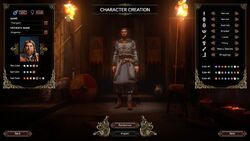Ken Rolston (Oblivion's lead designer) retirement interview
Ken Rolston (Oblivion's lead designer) retirement interview
Interview - posted by Vault Dweller on Tue 23 May 2006, 17:15:30
Tags: Bethesda Softworks; The Elder Scrolls IV: OblivionKen Rolston, Morrowind's & Oblivion's lead designer and a man of many virtues, has finally retired and answered a few questions for [H]Consumers:
How has the industry changed since you started, and what do you think about those changes?
I had once dreamed that roleplaying games would transform culture. I expected roleplaying games to take their place alongside literature, drama, and cinema. It didn't happen that way, perhaps just because it is so much more work for users to produce a narrative than to consume one -- or perhaps because crafting narratives as a hobbyist is of interest only to a limited number of people. I'm only a little disappointed, though. For a small number of people, roleplaying games have become a uniquely satisfying pastime, perhaps even occasionally a vehicle for exploring the human condition.
As teams have grown larger, schedules longer, and production budgets titanic, computer games have become almost as slick and polished as television and cinema -- and often as dull and formulaic.That's coming from a lead designer, who invented his own formulas that contributed to the aforementioned dullness.
All the dialogue in Oblivion is voiced. How did that affect your approach to writing dialogue? Did it reduce the variety of dialogue you could write? If so, do you prefer fully-voiced dialogue or text dialogue with more branching?
I prefer Morrowind's partially recorded dialogue, for many reasons. But I'm told that fully-voiced dialogue is what the kids want. Fully-voiced dialogue is less flexible, less apt for user projection of his own tone, more constrained for branching, and more trouble for production and disk real estate.Latest Oblivion excuse: I did it for teh kidz!
The encounters in Oblivion -- enemies, equipment, and treasure -- are indexed to the player's current level. Why did you do it this way?
...I think leveling was, at first, perceived as a cure for the obvious balance flaws of Morrowind. But as we refined leveling gameplay during development, we appreciated how it made the game more fun in every way. It does feel a little artificial, and, to some extent, it robs the player of the joy of getting the crap kicked out him.Let me get this straight, this new feature robbed the player of joy, but it made the game more fun? Yep, time to go home, Ken.
Thanks, Twinfalls
How has the industry changed since you started, and what do you think about those changes?
I had once dreamed that roleplaying games would transform culture. I expected roleplaying games to take their place alongside literature, drama, and cinema. It didn't happen that way, perhaps just because it is so much more work for users to produce a narrative than to consume one -- or perhaps because crafting narratives as a hobbyist is of interest only to a limited number of people. I'm only a little disappointed, though. For a small number of people, roleplaying games have become a uniquely satisfying pastime, perhaps even occasionally a vehicle for exploring the human condition.
As teams have grown larger, schedules longer, and production budgets titanic, computer games have become almost as slick and polished as television and cinema -- and often as dull and formulaic.
All the dialogue in Oblivion is voiced. How did that affect your approach to writing dialogue? Did it reduce the variety of dialogue you could write? If so, do you prefer fully-voiced dialogue or text dialogue with more branching?
I prefer Morrowind's partially recorded dialogue, for many reasons. But I'm told that fully-voiced dialogue is what the kids want. Fully-voiced dialogue is less flexible, less apt for user projection of his own tone, more constrained for branching, and more trouble for production and disk real estate.
The encounters in Oblivion -- enemies, equipment, and treasure -- are indexed to the player's current level. Why did you do it this way?
...I think leveling was, at first, perceived as a cure for the obvious balance flaws of Morrowind. But as we refined leveling gameplay during development, we appreciated how it made the game more fun in every way. It does feel a little artificial, and, to some extent, it robs the player of the joy of getting the crap kicked out him.
Thanks, Twinfalls
There are 121 comments on Ken Rolston (Oblivion's lead designer) retirement interview














